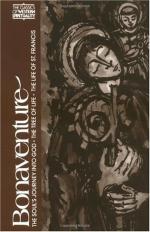|
This section contains 3,849 words (approx. 13 pages at 300 words per page) |

|
Dictionary of Literary Biography on Bonaventure
The thirteenth century can be characterized as the century of grand intellectual syntheses, and the thought of Saint Bonaventure stands out as a philosophical and theological synthesis equal to that of Thomas Aquinas. One a Franciscan and the other a Dominican, both men were officially recognized as regent masters at the University of Paris on the same day: 12 August 1257. Indeed, the philosophies of Bonaventure and Aquinas have come to represent the two most comprehensive interpretations of the universe as seen by Christians--the synthesis of Aquinas being essentially Aristotelian, while Bonaventure's edifice, attempting to render philosophically intelligible an essentially mystical and religious insight, represents the fullest expression of medieval Augustinianism.
Bonaventure was born in Bagnorea, in Tuscany, Italy, as Giovanni di Fidanza around 1217. His father, also named Giovanni, appears to have been a fairly well-to-do physician; his mother was Maria di Ritello (or Maria Ritella). While a boy, Bonaventure...
|
This section contains 3,849 words (approx. 13 pages at 300 words per page) |

|


